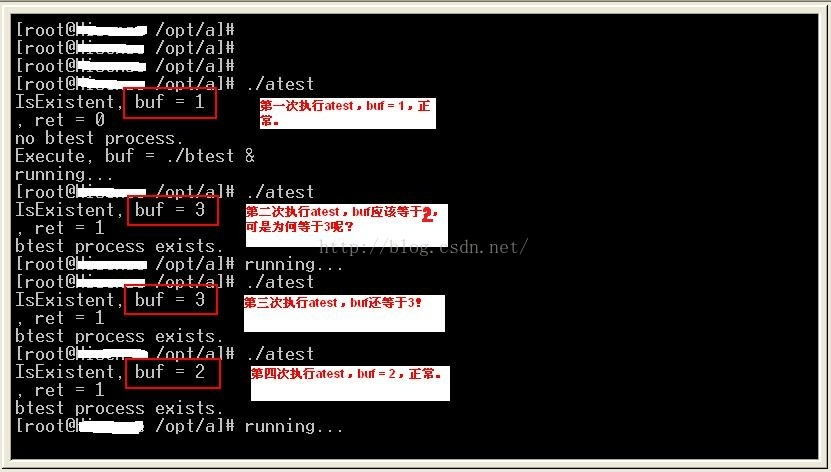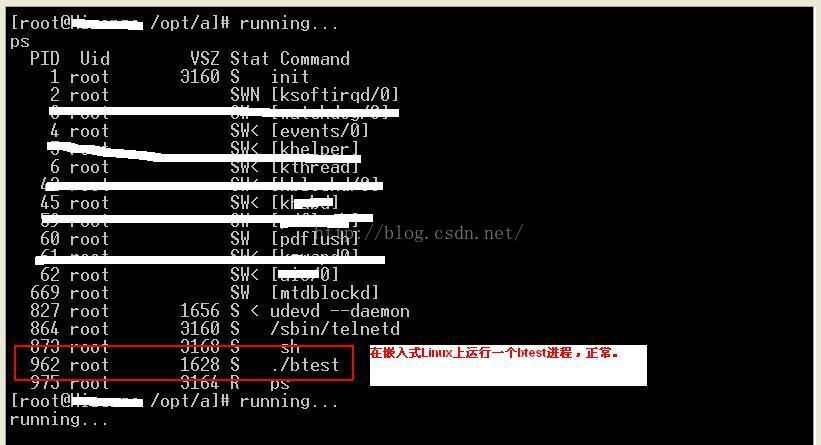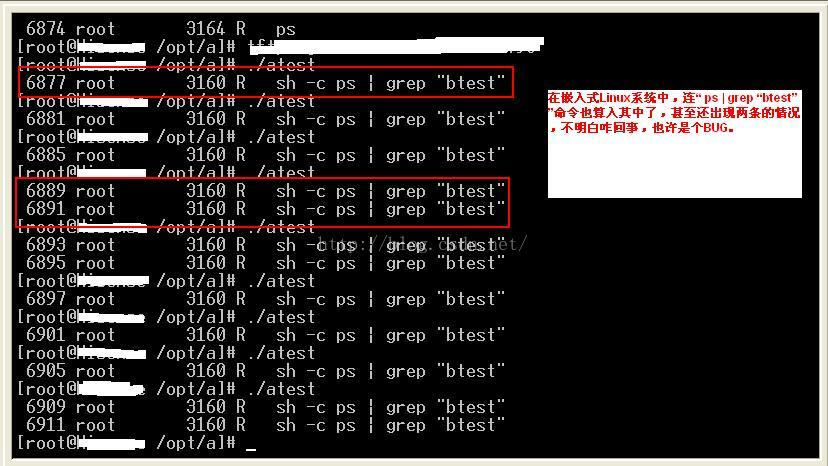下面程序演示了在嵌入式Linux和PC机Linux下使用popen函数时,程序的运行结果是有差异的。
两个程序 atest.c 和 btest.c,atest 检查是否有 btest 进程运行,如果没有就执行 btest 然后退出,如果有就直接退出。atest在检查时输出 btest 进程数,PC机是buf 值,但嵌入式是buf值减1,为什么?后面说明。
atest.c 源代码:
#include <stdio.h> #include <sys/time.h> static int IsExistent(const char * name) { int ret = 0; FILE *strm; char buf[128]; sprintf(buf,"ps | grep -c %s", name); if((strm=popen(buf, "r")) != NULL) { if(fgets(buf, sizeof(buf), strm) != NULL) { ret = atoi(buf) > 1 ? 1 : 0; printf("IsExistent, buf = %s, ret = %d ", buf, ret); } pclose(strm); } return ret; } static void Execute(const char * name) { char buf[128]; sprintf(buf, "./%s &", name); printf("Execute, buf = %s ", buf); system(buf); return; } int main() { if(0 == IsExistent("btest")) { printf("no btest process. "); Execute("btest"); }else { printf("btest process exists. "); } return 0; }
btest.c 源代码:
#include<stdio.h> int main() { while(1) { printf("running... "); sleep(3); } return 0; }
PC机Linux上的运行结果:


嵌入式Linux上的运行结果:


为什么在嵌入式系统上出现buf等于3的情况?先说说前面提到的“嵌入式是buf值减1”的原因。
如果 atest 中的 IsExistent 函数这样实现:
static int IsExistent(const char * name)
{
char buf[128];
sprintf(buf,"ps | grep "%s"", name);
system(buf);
return 0;
}
修改后的atest代码:
#include <stdio.h> #include <string.h> #include <sys/time.h> static int IsExistent(const char * name) { int ret = 0; FILE *strm; char buf[128]; //[]sprintf(buf,"ps | grep "%s" | grep -cv "grep"", name); sprintf(buf,"ps | grep "%s"", name); //[] system(buf); //[] return 0; //[] if((strm=popen(buf, "r")) != NULL) { if(fgets(buf, sizeof(buf), strm) != NULL) { ret = atoi(buf) > 0 ? 1 : 0; printf("IsExistent, buf = %s, ret = %d ", buf, ret); } pclose(strm); } return ret; } static void Execute(const char * name) { char buf[128]; sprintf(buf, "./%s &", name); printf("Execute, buf = %s ", buf); system(buf); return; } int main() { if(0 == IsExistent("btest")) { //[] printf("no btest process. "); //[] Execute("btest"); }else { //[] printf("btest process exists. "); } return 0; }
在嵌入式系统中运行,结果显示连 “ ps | grep "btest" ”命令也算入其中了,甚至还出现两条的情况,怎么回事?也许这是个BUG。截图:

把 IsExistent 函数中的命令 buf 如下赋值:
sprintf(buf,"ps | grep "%s" | grep -cv "grep"", name);
即再加一个 grep 命令,把含有“grep”单词的行去掉,结果就正常了。
修改后的atest代码:
#include <stdio.h> #include <string.h> #include <sys/time.h> static int IsExistent(const char * name) { int ret = 0; FILE *strm; char buf[128]; sprintf(buf,"ps | grep "%s" | grep -cv "grep"", name); if((strm=popen(buf, "r")) != NULL) { if(fgets(buf, sizeof(buf), strm) != NULL) { ret = atoi(buf) > 0 ? 1 : 0; printf("IsExistent, buf = %s, ret = %d ", buf, ret); } pclose(strm); } return ret; } static void Execute(const char * name) { char buf[128]; sprintf(buf, "./%s &", name); printf("Execute, buf = %s ", buf); system(buf); return; } int main() { if(0 == IsExistent("btest")) { printf("no btest process. "); Execute("btest"); }else { printf("btest process exists. "); } return 0; }
是嵌入式Linux的BUG呢,还是有意这么设计的? 请知道的在下面留言说一说,谢谢~~~
原链接:https://blog.csdn.net/iw1210/article/details/47778247